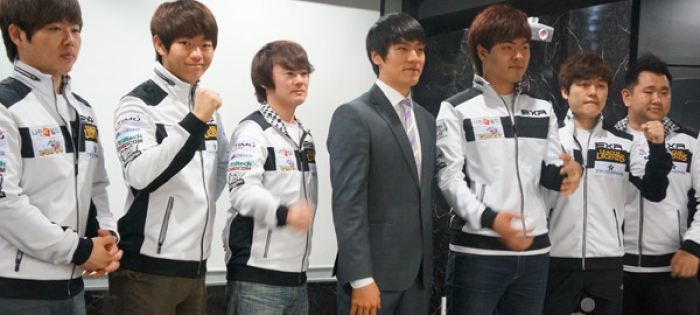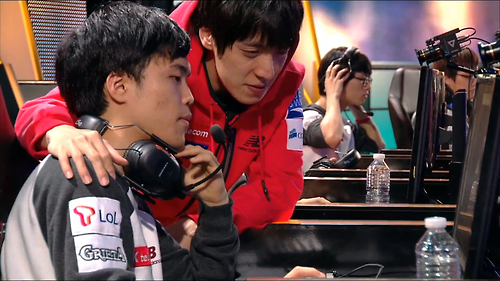
Article by James Chen
Growing pains are part of the fun in e-sports, especially in the current era. Under the panoptic scrutiny of Twitch.tv and the constant barrage of social media and Reddit threads, secrets and negotiations in the industry don't get to stay secret for very long—much to the chagrin and annoyance of team owners and players alike. In the case of China, in particular, not a week has gone by without yet another leak of a team's plans to recruit Korean players—at the time of this writing, the entire 2014 world championship team of Samsung White officially no longer exists, with much of their roster gone south for the winter.
The frankly crappy pay situation for players isn't new—Flash might've been making six-figure sums a year in Brood War's heyday, but they called the b-team players "free-team" for a reason—and it isn't unheard of for Korean talent to seek money abroad (as is with Jaedong). But this year's mass exodus out of Seoul is unprecedented in scale and completion—and should serve as a wakeup call for a region that's grown used to competitive dominance. South Korea's gotten very, very good at producing world-class players, yes, but especially now that the scions of Chinese billionaires are entering the picture, they have to get a lot better at deserving their players' loyalties. When your entire scene's S- and A-tier crop of players have been snatched up, not just by China's mindblowing promises of half-million dollar paychecks but by comparatively poorer North American and European organizations alike, you have absolutely screwed up.
But the real secret isn't in their players. South Koreans aren't born with an e-sports dominance gene, no matter what their more than decade-long rulership in digital competitions might suggest—rather, over that decade, since Brood War first graced their television sets and set a mob tens of thousands strong to storm Busan's beach, they've built an infrastructure and culture that leaves everybody's else's ad hoc efforts in the dust.
The players that they're spending so much money for weren't immaculately conceived—they didn't spontaneously appear one day among Korea's solo queue ladder, laying terror and waste to all before them. They were trained—refined under the crucible of the Korean training infrastructure of double-digit practice hours and staying up until 5 AM because the government's age restriction software prevents kids and students from gaming after midnight. Most importantly, they were coached: former Brood War players, experts in the mindset and effort it takes to play at the highest competitive level, and backed by a small staff of assistants and analysts to peel apart their players' bad habits and scout that of their rivals.
Even now, there isn't anything like that in the west. Teams in the LCS are generally player-run, and organizational and enforcement power largely lies in their hands. The role of the coach's still largely superseded by the will of the players, and rumor has it that more than one otherwise notable analyst and coach in the scene's finding it hard to get the bare modicum of respect from their charges. The reason for this is obvious, even as it is ludicrous: it is held by many influential pro players that they are the experts of their domain, so coaches and analysts otherwise offer relatively little for them to improve on.
Such a viewpoint is inherently fallacious, of course. Being good in your role, if only on that patch or metagame, doesn't make you infallible to the problems of subjectivity. It doesn't give you a particularly good grasp of synergistic strategies, gives you very little information on what the other team's likely to do from game to game, and overtly encourages a complacent attitude in the face of growing competition. It also does very little to explain why Korea's so consistently dominant—information and nuances of the game is, after all, the same where-ever you play it. It doesn't explain how Faker could be so dominant in patch after patch, or how DanDy's ruled the jungle for so long. And it is certainly not the attitude to have if you're gunning for the world title.
Keep up to date with the most important stories and the best deals, as picked by the PC Gamer team.
The secret is that players are only half of the puzzle, and nowhere is it more dramatically demonstrated than in Season 3's world championship organization. SKT T1 S failed to lift off the ground despite head coach Kk0ma's best efforts, sure—but his switch in focus to the sister team coincided with K's sharp decline from back-to-back world titlebearers and OGN winners to group stage rejects. And, frankly, that period was the best that S's (sadly) ever looked.

Similarly, the fate of world championship winners Samsung White in 2013 and 2014 tells a familiar tale. Dade and company had shown up in Season 3 with full expectation of an easy group stage, only to get knocked out early to the delight of western fans—their world championship win the following year is largely treated as a redemptive moment for the team sans Dade, who was transferred to their sister team. But that's not even half of the tale. In 2013, prior to the tournament, they were still operating as MVP Ozone, a lesser organization that was later absorbed by the Samsung chaebol juggernaut. They also operated with Choi Yoon-sang and Im Hyun-suk as head coaches of the MVP teams.
Neither of them survived the transition to Samsung. Informally, I have been given reason to suspect that the MVP Ozone team was left entirely without coaching during the transition, the timing of which overlapped with the October championship of Season 3, as the promise of chaebol support was apparently even more important than a world championship title.
So the real reason to fear China isn't because they absorbed all the best players. No, the reason why China's going to outright buy the next title's because they took all the coaches along with them! Apparently, they've gutted SKT and Samsung alike—and, if anything, China's late to the party, as the rapid improvements to the Southeast Asian scene can largely be placed at the door of former Xenics coach Lee In-cheol's efforts with Saigon Jokers and Saigon Fantastic Five.
So why aren't we seeing the same with the western hemisphere? Riot's implemented fiscal support for coaches in the LCS circuits too, and we've seen former world champions getting snapped up by the English-speaking community, so it isn't a bidding issue. Yet the only real coaching transfer to date was of Jin Air's Tracer to LMQ—and LMQ, notably, was formerly a Chinese team. Even TSM's acquisition of Locodoco's more the exception that proves the rule, as he wasn't exactly picked up off his prior work as a KeSPA coach (in fact, he had switched to a Hearthstone team in the interim).
Instead, the western scene's obsessed with this fictitious idea that they can win if only they acquired the right sort of talent—fictitious and dangerous. You can find talent anywhere. You can take a platinum scrub and polish him into a diamond, as Taiwan's Yoe Flash Wolves've done with top laner Steak, and as Moscow 5 did with Diamondprox. But the west's insistence on importing talent instead of coaching means that the talents that exist at home, both at the pro and amateur level, are still left at a disadvantage compared to their eastern peers. They are still left without the fundamental work that'll transform them into legitimate threats on the world stage.
At this rate, they'll still be third-rates at Worlds, and that's just depressing.
There's still time—an entire month before the next season starts, and then an entire split before the summer determines the American and European representatives. It might not be necessary to import Korean coaches to win, but it is necessary to take coaches more seriously, along with everything that position implies. The players need to be willing to be coached—to submit to authority, to follow guidance, and to enact the vision of a non-player. In other words, to learn to swallow their pride.
If the warped panoptical prism of social media's anything to go by, that in itself is going to be a lot of work. Best get started.
PC Gamer is the global authority on PC games—starting in 1993 with the magazine, and then in 2010 with this website you're currently reading. We have writers across the US, Canada, UK and Australia, who you can read about here.


